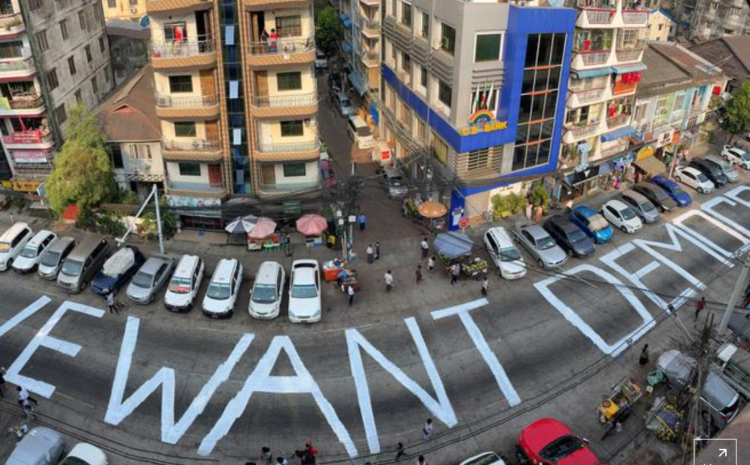Early on Sunday, police arrested a famous actor wanted for supporting opposition to the coup, his wife said, while Facebook deleted the military’s main page under its standards prohibiting the incitement of violence.
The military has been unable to quell the demonstrations and a civil disobedience campaign of strikes against the coup and the detention of elected leader Aung San Suu Kyi and others, even with a promise of a new election, arrests and warnings against dissent.
In the main city of Yangon, several thousand young people gathered at two sites to chant slogans, while hundreds massed peacefully in the second city of Mandalay, footage shown by a media outlet showed.
In Myitkyina town in the north, which has seen confrontations in recent days, people laid flowers for the dead protesters while young people with banners drove around on motorbikes.
Crowds marched in the central towns of Monywa and Bagan and in Dawei and Myeik in the south, posted pictures showed.
“They aimed at the heads of unarmed civilians. They aimed at our future,” a young protester in Mandalay told the crowd.
Military spokesman Zaw Min Tun, who is also the spokesman for the new military council, has not responded to attempts by Reuters to contact him by telephone for comment.
He told a news conference on Tuesday the army’s actions were within the constitution and supported by most people, and he blamed protesters for instigating violence.
The more than two weeks of protests had been largely peaceful, unlike previous episodes of opposition during nearly half a century of direct military rule to 2011.
‘AGGRESSIVE PROTESTERS’
Members of ethnic minorities, poets and transport workers marched peacefully on Saturday in various places but tension escalated in Mandalay where police and soldiers confronted striking shipyard workers.
Some demonstrators fired catapults at police as they played cat and mouse. Police responded with tear gas and gunfire at the protesters, witnesses said.
Video clips on social media showed members of the security forces firing and witnesses said they found the spent cartridges of live rounds and rubber bullets.
Two people were shot and killed and 20 were wounded, said Ko Aung, a leader of a volunteer emergency service.
Police were not available for comment but the state-run Global New Light of Myanmar newspaper said the strikers sabotaged vessels and attacked police with sticks, knives and catapults. Eight policemen and several soldiers were injured, it said.
The newspaper did not mention the deaths but said: “Some of the aggressive protesters were also injured due to the security measures conducted by the security force.”
A young woman protester became the first death among anti-coup demonstrators on Friday. She was shot in the head on Feb. 9 in the capital, Naypyitaw. The army says one policeman has died of injuries sustained in a protest.
Suu Kyi’s National League for Democracy (NLD) condemned the violence in Mandalay as a crime against humanity.
The army seized power after alleging fraud in Nov. 8 elections that the NLD swept, detaining Suu Kyi and others. The electoral commission had dismissed the fraud complaints.
Facebook said it deleted the military’s main page, Tatmadaw True News Information, for repeated violations of its standards “prohibiting incitement of violence and coordinating harm”.
‘DEEPLY CONCERNED’
Early on Sunday, police arrested actor Lu Min, who has been a prominent figure in Yangon protests and was one of six celebrities who the army said on Wednesday were wanted under an anti-incitement law for encouraging civil servants to join the protest.
His wife, Khin Sabai Oo, said in a video posted on his Facebook page that police had come to their home in Yangon and taken him away.
The Assistance Association for Political Prisoners activist group says 569 people have been detained in connection with the coup.
Western countries that earlier condemned the coup spoke out against the violence.
U.S. State Department spokesman Ned Price said the United States was “deeply concerned” by reports that security forces had fired on protesters.
France, Singapore and Britain also condemned the violence, with British foreign minister Dominic Raab saying shooting protesters was “beyond the pale”.
U.N. Secretary-General Antonio Guterres said on Twitter lethal force was unacceptable.
The United States, Britain, Canada and New Zealand have announced limited sanctions with a focus on military leaders but the generals have long brushed off foreign pressure.
Suu Kyi faces a charge of violating a Natural Disaster Management Law as well as illegally importing six walkie-talkie radios. Her next court appearance is on March 1.
Reporting by Reuters staff; Writing by Robert Birsel; Editing by William Mallard and Lincoln Feast.
Our Standards: The Thomson Reuters Trust Principles

